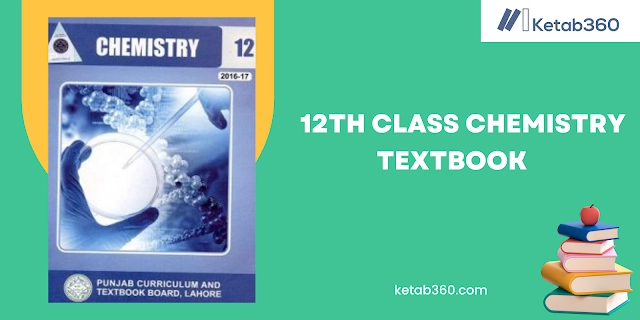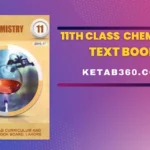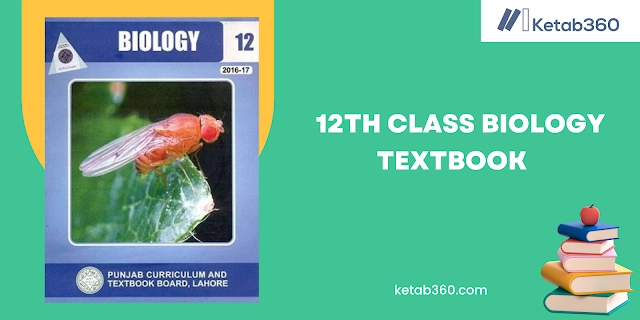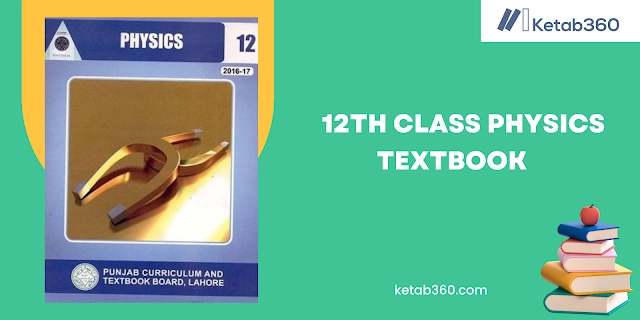12th Class Chemistry Book By Punjab Board
Download the PDF of the Chemistry book for Class 12Punjab Board, which is also available for online reading. This Chemistry textbook is designed for 2nd-year students of FSC (in English). It is intended for personal use only, specifically for those who do not have access to the hard copy.
The 11th and 12th grades are highly crucial for a Pakistani high school student’s academic journey. Subject scores significantly influence the selection of professional degrees. Given the importance of the 12th grade, all the books designed for its curriculum undergo careful review.
The Chemistry book comprises 16 chapters, specifically crafted to help students grasp the concepts of inorganic and organic chemistry. Until this stage, students were only introduced to the names of organic and inorganic chemistry.
Now, they will gain a profound understanding. The first six chapters delve into inorganic chemistry, beginning with the construction of the periodic table. The latter half of the book covers intricate concepts in organic chemistry, which will undoubtedly captivate your interest.
- For every new concept, diagrams are provided.
- Visualizations explain the dimensions of nearly every new compound.
- Tables are included for further clarification.
- At the conclusion of the book, you will discover a glossary and index.
- Each chapter includes extensive exercises covering all sections.
- Numerical problems are incorporated where necessary.
- Objective type questions and short questions are included to facilitate exam preparation.
What does the book contain?
This book is indeed a treasure trove with a multitude of concepts awaiting exploration. Brace yourself for the most extensive science chapters present in the chemistry book. Unlike the first-year chemistry book, these chapters offer a refreshing level of novelty. This is anything but a dull book, as the authors have painstakingly ensured that learners delve into every aspect of the elements featured in the periodic table.
Unit No 1. Periodic Classification Of Elements & Periodicity
This chapter focuses on the structure and construction of the periodic table. Students might already be familiar with it from their 9th-grade studies. However, at the 12th standard, the topic is explained in greater detail, which is vital for understanding the properties of elements.
To excel in questions related to this chapter, students should emphasize memorization. But, apart from that, there are other effective ways to learn about an element’s properties. Additionally, a bit of conceptual analysis is necessary to grasp the underlying trends.
Unit No 2. S-block elements
The initial section of the periodic table is referred to as the S-block. While it may be relatively short, the elements contained within exhibit high reactivity. This chapter is essential to grasp the trends, properties, and limitations of these elements; skipping it is not advisable.
Towards the conclusion of the chapter, you will also gain insights into the industrial significance of sodium and other vital compounds.
Unit No 3. Group IIIA & Group IVA Elements
This chapter is dedicated to exploring groups 3A and 4A of the periodic table. Carbon stands out as the most crucial element within this chapter, serving as the fundamental basis of organic chemistry. Hence, omitting this chapter from your study is not advisable.
Unit No 4. Group VA & VIA Elements
This chapter focuses on the 5th and 6th A groups of the periodic table. Although the pattern remains consistent, it delves into a detailed discussion of the most crucial elements, which can significantly impact the subjective part of the exam.
Unit No 5. The Halogens & The Noble Gases
This chapter revolves around halogens, which are highly reactive compounds known for their propensity to react with metals. It promises to be an enjoyable chapter as the compounds discussed here are quite familiar.
Unit No 6. Transition Elements
Transition elements, often overlooked in discussions. Despite sounding challenging, similar to metals, these elements are relatively easy to learn.
Unit No 7. Fundamentals Principles Of Organic Chemistry
The fundamental principles of organic chemistry in this chapter closely resemble the concepts you studied in the 9th class about alkanes, alkenes, and alkynes.
Unit No 8. Aliphatic Hydrocarbons
This chapter revolves around hydrocarbons. You will be intrigued by how a single hydrogen atom can alter the parent compounds, making it a fascinating concept.
Unit No 9. Aromatic Hydrocarbons
This chapter focuses on aromatic hydrocarbons, an essential topic within organic chemistry, which is a profound and intricate concept.
Unit No 10 & 11. Alkyl Halides – Alcohols Phenols & Ethers
Discover the fascinating reactions that occur when hydrocarbons interact with halogens. Both hydrocarbons and halogens are highly reactive, making the study of their reactions enjoyable. This chapter is centered around exploring this very concept. The 11th chapter delves into alcohol, phenols, and ethers.
Unit No 12 & 13. Aldehydes & Ketones – Carboxylic Acids
The 12th chapter focuses on aldehydes and ethers, while the 13th chapter covers carboxylic acids. Both of these chapters are crucial for succeeding in the practical paper of chemistry.
Unit No 14 To 16. Macromolecules – Environmental Chemistry
The 14th chapter delves into macro-molecules, which are significant for understanding various industries on a large scale and even the intricacies of human beings on a smaller scale. In the 15th chapter, students will explore common industries in Pakistan, while the last chapter focuses on environmental chemistry.
Tips for Effective Study of 12th Grade Chemistry Text Book in PDF Format.
Chemistry Text Book effectively in the 12th grade can be accomplished even when using PDFs. Consider the following strategies:
To ensure a focused study session while engaging with the Chemistry Punjab Text Book , consider the following suggestions:
- Disconnect from the internet: Disable internet connectivity while studying to minimize distractions and maintain concentration on the material.
- Keep pen and paper handy: Have a pen and paper nearby to jot down important points, key concepts, or any thoughts that arise during the study session. This aids in better retention and organization of information.
- Utilize the internet selectively: Turn on the internet only when necessary, such as when you require additional information on specific topics. Use it as a supplementary resource rather than a constant distraction.
- Capture screenshots: If you come across confusing sections or passages in the book, take screenshots to share them with your teacher or classmates for clarification and discussion. This promotes collaborative learning and helps in resolving doubts.
- Prioritize eye safety: Take care of your eyes while studying by wearing appropriate protective gear, such as glasses or utilizing screen filters. This ensures your eyes remain safe and minimizes strain during extended study sessions.
By implementing these recommendations, you can enhance your focus, note important points, utilize the internet judiciously, collaborate with others, and safeguard your eyes while studying the Chemistry Text Book.






